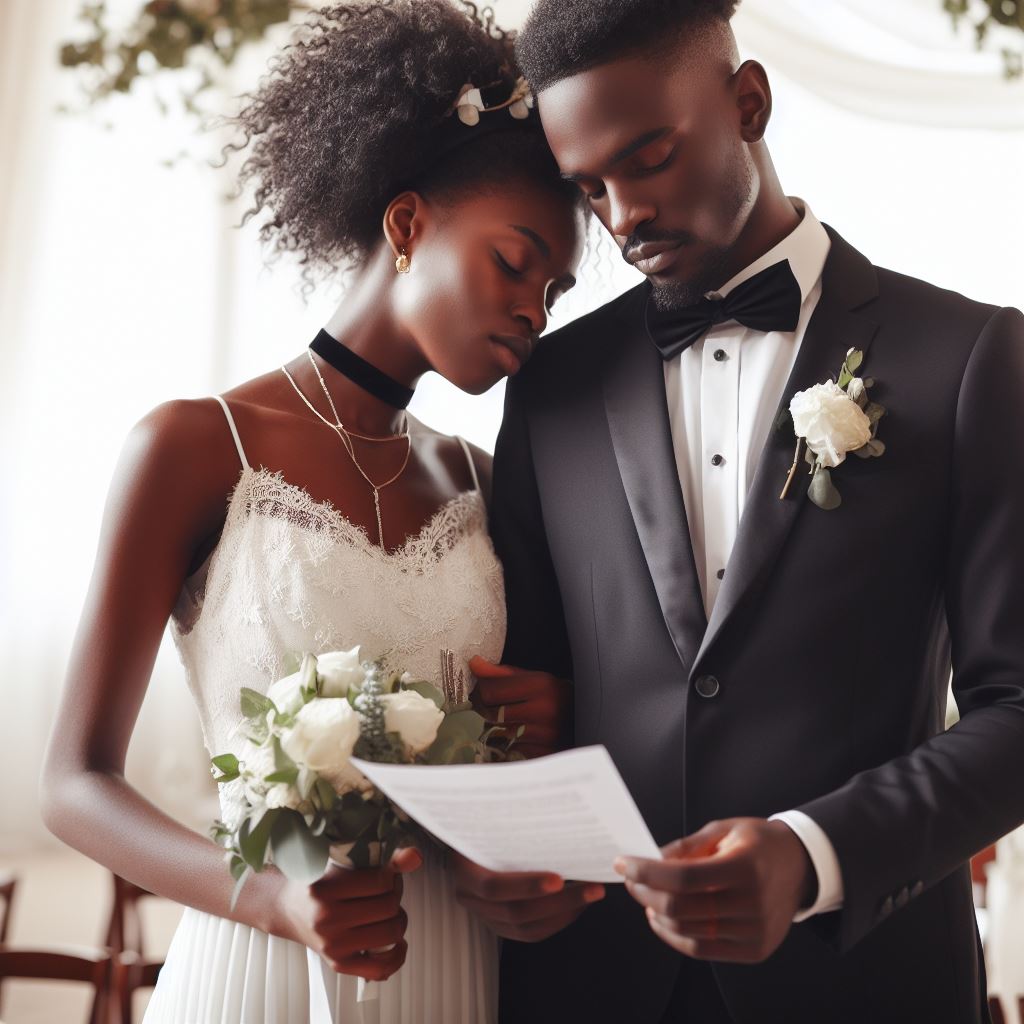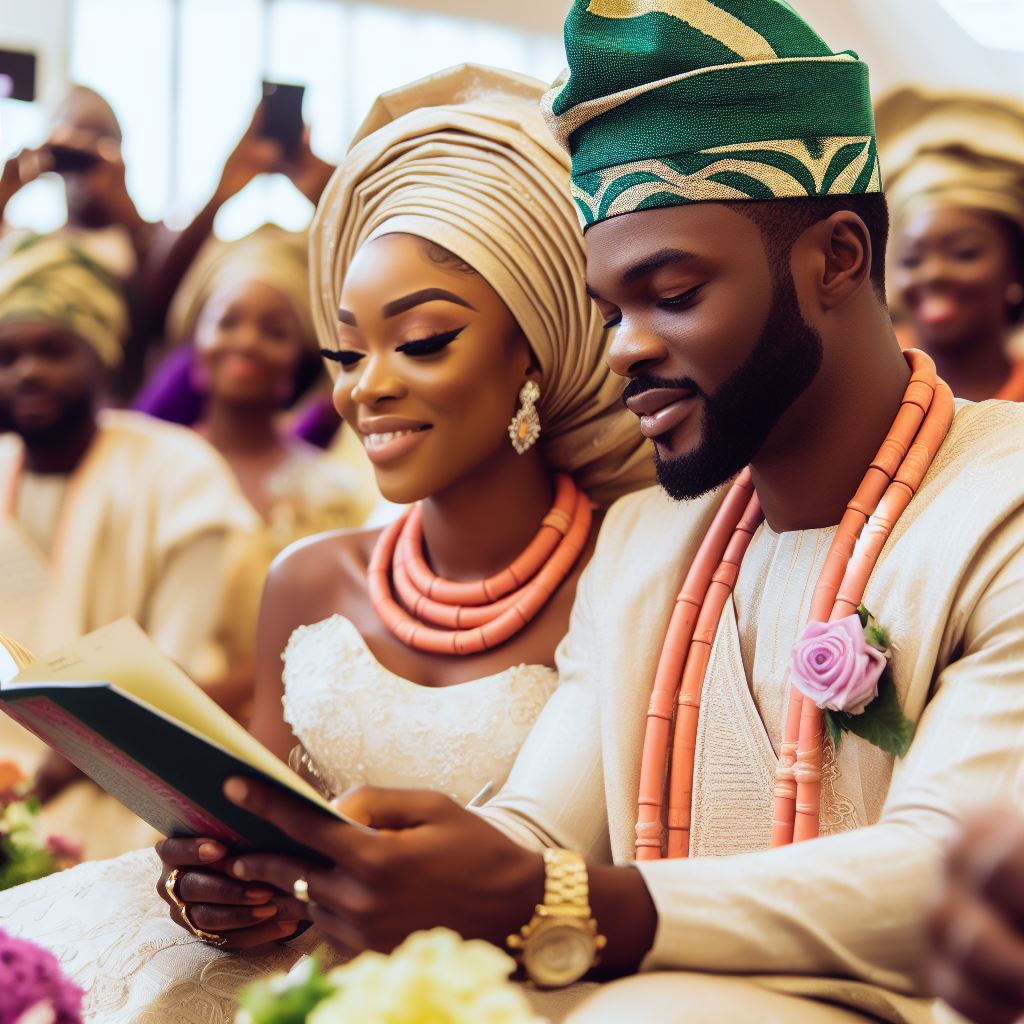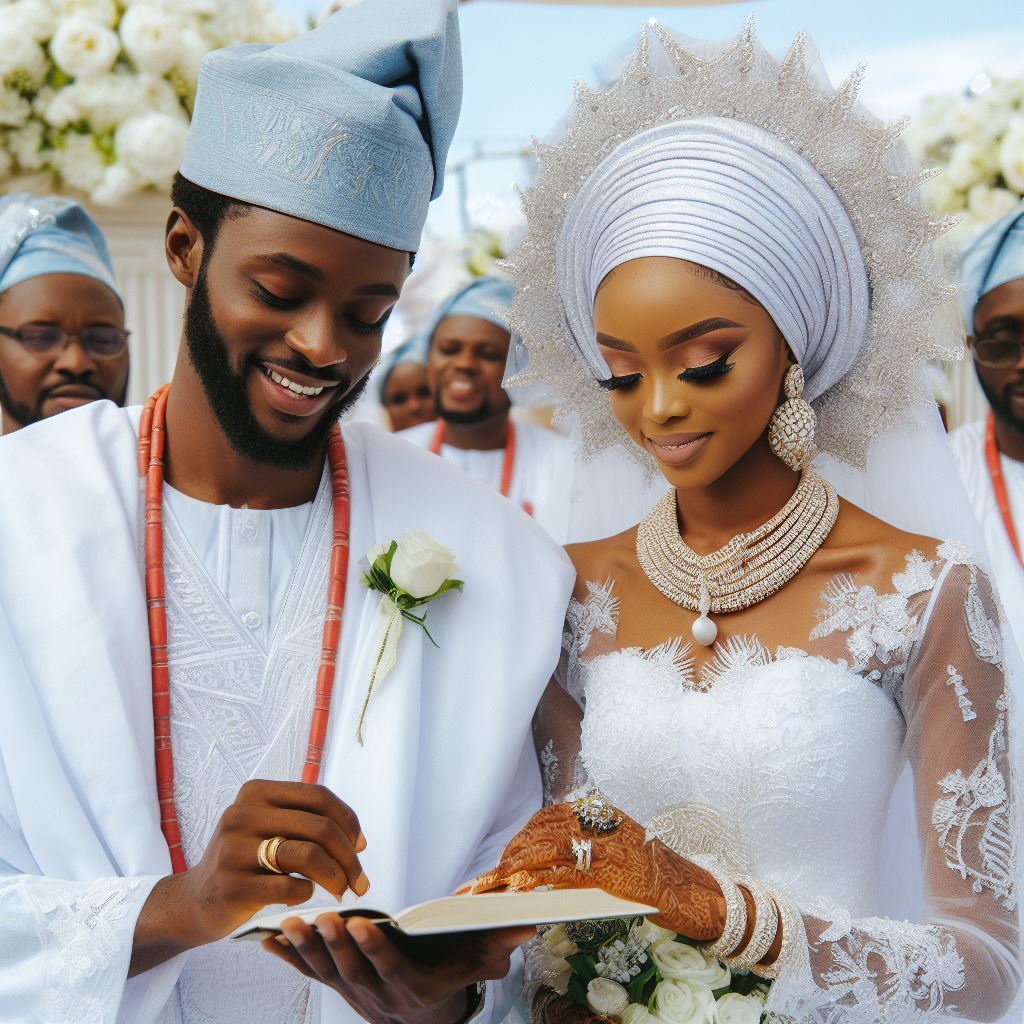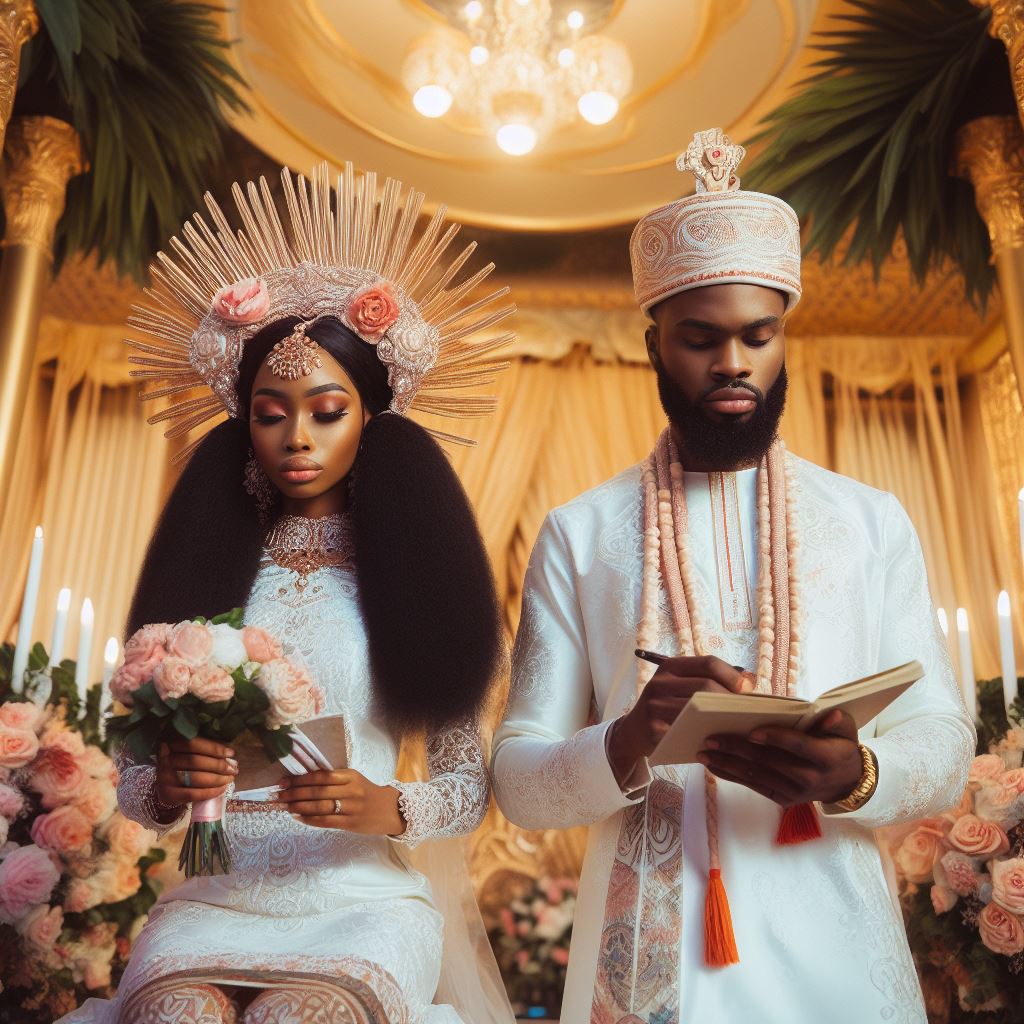Introduction
Let’s explore marriage vows: Their origin and importance in Nigeria.
Marriage vows hold great significance in Nigerian culture, as they play a pivotal role in the union between two individuals.
The importance of these vows lies in their ability to solidify the commitment and dedication of the couple towards each other.
Through vows, couples express their love, faithfulness, and desire for a lifelong partnership.
These promises are deeply rooted in tradition and are seen as a sacred bond.
In Nigerian culture, marriage is not just a union between two individuals but also a joining of families and ancestors.
Marriage vows serve as a symbol of unity, trust, and loyalty, not just between the couple but also between their families.
They are witnessed by friends, relatives, and members of the community, who hold the couple accountable to their promises.
Furthermore, marriage vows serve as a guide and reminder for the couple throughout their marital journey.
They serve as a compass during challenging times, reminding the couple of their commitment to one another and encouraging them to work through difficulties.
These vows provide a strong foundation for the relationship and help to strengthen the bond between husband and wife.
In Nigerian culture, marriage vows are not to be taken lightly.
They are seen as sacred promises, and breaking them is considered a dishonor to one’s family and community.
The significance of marriage vows in Nigeria emphasizes the importance of commitment and fidelity in relationships.
In short, marriage vows have a deep-rooted significance in Nigerian culture.
They serve as a symbol of commitment, unity, and loyalty between couples and their families.
Upholding these promises is not only important for the couple but also for their family and community.
Historical background of marriage vows in Nigeria
In traditional Nigerian weddings, marriage vows have a deep-rooted origin that dates back centuries ago.
These vows hold significant cultural value across different ethnic groups in the country.
1. Origin of marriage vows in traditional Nigerian weddings
Marriage vows have been an integral part of Nigerian weddings since ancient times.
They can be traced back to the traditional practices and beliefs of the Nigerian people.
The vows were initially used as a means of solidifying the union between a man and a woman.
The origin of marriage vows in Nigeria can be attributed to the importance placed on the concept of marriage in society.
Marriage was seen as a sacred institution that brought families together and ensured the continuity of lineage.
As a result, the vows served as a solemn promise of commitment between the couple.
2. Cultural significance of marriage vows in different Nigerian ethnic groups
Yoruba ethnic group
In Yoruba culture, marriage vows are referred to as “Igba-nkwu.”
The vows are recited in the presence of family members, elders, and the deities.
They are considered binding and are believed to be watched over by the ancestors.
The marriage vows in Yoruba culture serve as a guide for the couple throughout their married life.
They include promises of love, respect, fidelity, and partnership.
These vows are seen as the foundation of a successful marriage.
Igbo ethnic group
In Igbo culture, marriage vows are known as “Igba-nkwu.”
These vows are recited during the traditional wedding ceremony and hold immense cultural significance.
They symbolize the couple’s commitment to each other and their families.
The marriage vows in Igbo culture emphasize the roles and responsibilities of both the husband and the wife.
They include promises of loyalty, support, and the building of a strong family unit.
These vows are seen as a way of maintaining and preserving the cultural values of the Igbo people.
Hausa ethnic group
In Hausa culture, marriage vows are known as “Kayan Laffiya.”
The vows are recited during the wedding ceremony in the presence of witnesses and family members.
They are considered essential for the validity and success of the marriage.
The marriage vows in Hausa culture focus on the commitment, trust, and understanding between the couple.
They reflect the importance of unity, peace, and harmony within the marriage.
These vows are seen as a way of upholding the cultural values and traditions of the Hausa people.
In fact, marriage vows in Nigeria have a rich historical background that is deeply rooted in the traditions and cultural beliefs of the Nigerian people.
These vows serve as a symbol of commitment, love, and mutual respect between the couple.
They play a crucial role in traditional Nigerian weddings and are considered essential for a successful and lasting marriage in different ethnic groups across the country.
Traditional Nigerian marriage vows
In traditional Nigerian marriages, the exchange of vows is a significant ritual that holds great importance.
These vows are deeply rooted in the culture and values of the Nigerian people.
They encapsulate the couple’s commitment, responsibilities, and expectations within the sacred institution of marriage.
The common elements found in traditional marriage vows
Exploring the common elements found in traditional marriage vows, we discover that they are often rich in symbolism, language, and rituals.
These elements vary across the diverse ethnic groups in Nigeria, but some commonalities can be observed.
One common element in traditional Nigerian marriage vows is the emphasis on unity and togetherness.
Couples promise to be united as one and to support each other through all challenges and triumphs.
This reflects the African proverb, “Two heads are better than one,” highlighting the importance of collaboration and teamwork in a marriage.
Another element is the recognition of the extended family and community.
Nigerian marriages are not just a union between two individuals but a merging of families and tribes.
The vows often acknowledge the support and involvement of the families and communities throughout the marriage journey.
The meaning behind specific words, phrases, and rituals in Nigerian marriage vows
Specific words and phrases in Nigerian marriage vows hold profound meaning.
For instance, the word “tolani” in Yoruba vows means “our home is yours.”
It signifies the couple’s commitment to make their home a welcoming and nurturing place for each other and their future children.
Rituals also play a significant role in Nigerian marriage vows. A popular ritual is the exchange of kolanuts.
The couple presents kolanuts to each other as a symbol of hospitality and the willingness to share their lives together.
This ritual represents the importance of generosity, respect, and the willingness to provide for one another.
In Igbo culture, the couple can participate in the “tasting of the four elements.” Each element represents a different aspect of their marriage.
They taste bitter kola for bitterness, palm wine for sweetness, honey for tenderness, and hot pepper for spice.
In Hausa culture, the couple can engage in the “breaking of the calabash” ritual.
The calabash, a traditional gourd, is broken into pieces, symbolizing the couple’s commitment to never separate or break apart.
This ritual demonstrates their dedication to staying together regardless of the trials they may encounter.
These traditional Nigerian marriage vows are not mere words spoken during the wedding ceremony; they hold deep meaning and significance.
They reflect the values, beliefs, and cultural heritage of the Nigerian people.
In essence, traditional Nigerian marriage vows encompass a range of elements that are deeply rooted in their cultural and societal values.
These vows emphasize unity, togetherness, and the importance of family and community.
Specific words, phrases, and rituals hold significant meaning, symbolizing various aspects of married life.
Moreover, the exchange of vows is a powerful way to express commitment, responsibility, and honor within the sacred institution of marriage in Nigeria.
Read: The Role of Faith in Strengthening Nigerian Marriages
Evolution of marriage vows in modern Nigeria
The influence of Western culture on contemporary Nigerian marriage vows
Western culture has played a significant role in shaping contemporary Nigerian marriage vows.
With the influx of Western ideas and practices, traditional marital customs have been modified to accommodate new concepts and principles.
One influence of Western culture on Nigerian marriage vows is the shift from arranged marriages to love marriages.
Traditionally, marriages in Nigeria were mainly arranged by parents or family members, where the couple had little or no say in the matter.
However, Western influence has led to a shift in values, and now, individuals have the freedom to choose their life partners based on love and personal compatibility.
Additionally, Western cultures emphasize individualism and personal fulfillment, which has impacted the content of marriage vows in Nigeria.
Contemporary Nigerian couples tend to include promises of love, support, and emotional fulfillment in their vows, reflecting the Western ideals of equal partnership and companionship in marriage.
Furthermore, the influence of Western culture is evident in the incorporation of religious elements in contemporary Nigerian marriage vows.
Christian ceremonies, which are heavily influenced by Western traditions, have become popular in Nigeria.
As a result, many couples include religious references and prayers in their vows, adding a spiritual dimension to their marital commitment.
Modernization and its impact on the content and delivery of marriage vows in Nigeria
The process of modernization has brought about significant changes in the content and delivery of marriage vows in Nigeria.
Urbanization, globalization, and technological advancements have all contributed to the evolution of marriage ceremonies and vows.
With increased exposure to different cultures and lifestyles through globalization, Nigerian couples now have a broader range of options when it comes to designing their marriage vows.
They can draw inspiration from various traditions, religions, or even popular culture to create personalized and unique vows that reflect their values and aspirations.
Moreover, modernization has led to the use of technology in marriage vow delivery.
Couples can now share their vows on social media platforms, record personalized videos, or even live stream their wedding ceremonies for friends and family who cannot physically attend.
This modern approach to vow delivery allows for a wider audience and ensures that the sentiments expressed during the vows are preserved for posterity.
Additionally, modernization has resulted in the inclusion of egalitarian language in marriage vows.
In the past, Nigerian marriage vows often reflected hierarchical gender roles, with the man having more dominant and authoritative language.
However, contemporary vows strive for equality, with both partners making promises and commitments to each other as equals.
In general, the evolution of marriage vows in modern Nigeria has been influenced by Western culture and the process of modernization.
Moreover, western ideas and practices have introduced new concepts, such as love marriages and individual fulfillment, while modernization has expanded the options for vow content and delivery.
These changes reflect the dynamic nature of Nigerian society and the desire of couples to create meaningful and personalized marriage vows.
Read: Foundations of a Godly Marriage: Biblical Insights

Significance and importance of marriage vows in Nigerian society
The significance and importance of marriage vows in Nigerian society cannot be overstated.
They play a crucial role in solidifying the commitment between spouses and contribute to the stability of Nigerian marriages.
Role of marriage vows in solidifying the commitment between spouses
- Marriage vows serve as a public declaration of love and commitment between two individuals.
- They provide a strong foundation for trust and loyalty in a marriage.
- By exchanging vows, spouses promise to support and care for each other throughout their lives.
- Marriage vows create a sense of security and reassurance in the relationship.
- They symbolize the willingness of both partners to work through challenges and conflicts.
- Marriage vows foster a deeper emotional connection and bond between spouses.
Contribution of marriage vows to the stability of Nigerian marriages
- Marriage vows serve as a guide and reminder of the commitments made during the wedding ceremony.
- They provide a framework for resolving conflicts and overcoming difficulties.
- Marriage vows hold spouses accountable for their promises and encourage them to uphold their responsibilities.
- They create a sense of continuity and permanence in the relationship, even during challenging times.
- They promote teamwork and shared decision-making, strengthening the partnership.
- Marriage vows act as a reminder of the importance of compromise and forgiveness in a marriage.
- They contribute to the overall satisfaction and fulfillment within Nigerian marriages.
In review, marriage vows hold immense significance and importance in Nigerian society.
They play a vital role in solidifying the commitment between spouses and contribute to the stability and success of marriages.
By exchanging vows, couples establish a strong foundation for trust, loyalty, and support.
Marriage vows act as a guide, fostering better communication, teamwork, and resilience in the face of challenges.
Lastly, the power of marriage vows lies in their ability to reaffirm love, inspire growth, and create lifelong partnerships.
Read: Invitation Card Mistakes Nigerian Couples Should Avoid
Challenges and controversies surrounding marriage vows in Nigeria
Marriage vows in Nigeria, like in any other society, face various challenges and controversies.
These issues range from breaches of vows to debates about their relevance and validity in contemporary times.
Breaches of marriage vows and their consequences
Marriage vows are sacred promises made by couples during their wedding ceremony.
However, in Nigeria, as in other parts of the world, breaches of marriage vows are not uncommon.
These breaches can have severe consequences for the individuals involved as well as their families and communities.
One major challenge is infidelity, which involves a breach of the exclusive commitment to one’s spouse.
Infidelity can result in emotional pain, loss of trust, and often leads to the breakdown of the marriage.
Additionally, breaches of vows related to financial responsibilities such as providing for the family or maintaining joint accounts can lead to conflicts and disputes.
Consequences of breaching marriage vows in Nigeria can vary.
In some cases, it may lead to divorce or separation, causing emotional distress and disrupting the lives of the individuals involved.
In traditional Nigerian society, such breaches may also bring shame and dishonor to the families involved.
Debates surrounding the relevance and validity of traditional marriage vows in modern times
As society evolves, debates surrounding the relevance and validity of traditional marriage vows have emerged.
Some argue that these vows are outdated and fail to address the complexities of modern relationships.
Moreover, they believe that vows should be adapted to contemporary norms and values.
One controversial aspect is the concept of submission, which is often included in traditional marriage vows.
Critics argue that this perpetuates gender inequality and restricts the autonomy and independence of women.
They advocate for vows that emphasize equality, mutual respect, and shared decision-making.
Another point of debate is the rigidity of traditional vows. Critics argue that they do not allow room for growth and change within a marriage.
They argue for vows that acknowledge the importance of personal development and the need for adaptation as couples navigate through various stages of life.
However, proponents of traditional marriage vows argue that they hold cultural and symbolic significance.
They believe that these vows provide a strong foundation for the institution of marriage and should be preserved.
hence, they highlight the importance of cultural heritage and the sense of commitment and responsibility that traditional vows instill.
In brief, marriage vows in Nigeria face challenges and controversies that range from breaches of vows to debates about their relevance.
It is crucial to address these issues to ensure that marriage vows continue to serve as a meaningful and guiding force for couples in contemporary times.
Read: Why RSVP Matters: Making the Most of Your Wedding Card
Conclusion
Marriage vows hold immense importance and cultural significance in Nigeria.
They serve as a solemn commitment between partners, their families, and the community.
These vows are not merely symbolic but carry legal and spiritual weight, binding the couple in a lifelong union.
Marriage vows in Nigeria reflect the values, traditions, and customs of different ethnic groups, celebrating their unique heritage.
They are a testament to the sanctity of marriage and a declaration of love, loyalty, and mutual respect.
Marriage vows also serve to foster unity and harmony within the extended families and communities.
Despite the changing times and modern influences, the significance of marriage vows remains intact in Nigerian weddings.
They contribute to the preservation of culture, strengthen family ties, and provide a solid foundation for a successful marriage.
Moreover, marriage vows continue to be relevant as they remind couples of their commitment and help them navigate challenges in their marital journey.
In an ever-evolving society, these vows serve as a reminder of the importance of tradition and the enduring power of love and unity.
Therefore, marriage vows will always hold a special place in Nigerian weddings, carrying the values and legacies of generations.
They are a beautiful reminder of the sacredness of marriage and the bonds that tie individuals, families, and communities together.




